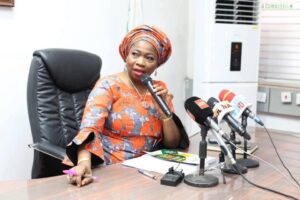
Senate, NIDCOM Appeal for Calm Over “Nigeria Must Go” Protest in Ghana
- Nigeria News
- 09.09.2025
- No Comment
- 143
Senate, NIDCOM Appeal for Calm Over “Nigeria Must Go” Protest in Ghana

following rising tensions in Ghana over a controversial movement tagged
“Nigeria Must Go”. The protest, which has gained traction in parts of Ghana,
has sparked diplomatic concerns and fears of xenophobic attacks against Nigerian nationals living
and working in the country. With social media amplifying the campaign, both governments are under
pressure to prevent the situation from escalating into a major diplomatic crisis.
In 1983, Nigeria expelled thousands of Ghanaians during an economic downturn, an event that
has lingered in the collective memory of Ghanaians. Now, in 2025, Ghanaian youths and activist
groups have reignited the slogan in response to perceived economic challenges and competition
for resources allegedly caused by Nigerian traders and migrants.The protest has spread across key Ghanaian cities, with demonstrators calling for stricter
immigration controls and accusing Nigerians of dominating local businesses, particularly in
retail, entertainment, and transport sectors. However, the campaign has drawn criticism from
human rights groups who view it as xenophobic and harmful to regional unity.

its citizens. During a plenary session, lawmakers emphasized the importance of
diplomatic engagement and urged the Federal Government to liaise with its Ghanaian
counterpart to protect Nigerians living abroad.The Senate President described the development as “worrisome” and cautioned against allowing
the incident to disrupt the cordial relationship between the two West African neighbors.
He further called for restraint, encouraging Nigerians in Ghana to remain calm and avoid
confrontations with locals.
statement appealing to Nigerian citizens in Ghana to exercise patience. NIDCOM reassured them
that the Federal Government is in close communication with Ghanaian authorities to ensure
their safety and welfare.According to NIDCOM,
The protest does not represent the official stance of the Ghanaian
government, and efforts are underway to address the situation through diplomatic channels.
The Commission emphasized that Nigeria and Ghana share strong bilateral ties and must work
together to prevent unnecessary hostilities.
- Economic Competition: Nigerian traders are often accused of dominating retail markets in Ghana, leading to resentment from local traders.
- Historical Animosity: The 1983 expulsion of Ghanaians from Nigeria still resonates in public discourse.
- Social Media Agitation: Hashtags and online campaigns have amplified the movement, mobilizing more protesters.
- Unemployment Concerns: With high youth unemployment in Ghana, migrants are sometimes scapegoated for economic challenges.
- Xenophobic Sentiments: Broader anti-immigrant rhetoric in the region has contributed to the tension.
West Africa, covering trade, security, and cultural exchange. However, recurring disputes,
particularly over trade policies and immigration, have strained relations in the past.
The current protest risks reigniting old wounds and could lead to economic and diplomatic setbacks.A deterioration in ties could also weaken ECOWAS’ broader goal of fostering regional integration
and free movement of people. Experts warn that if not managed carefully, the crisis could
encourage retaliatory sentiments in Nigeria, thereby escalating the situation further.
in sectors like hospitality, retail, and entertainment. However, several Ghanaian civic
groups have condemned the protests, labeling them “misguided” and warning against
xenophobia.On the Nigerian side, many citizens expressed frustration, pointing out that Nigerians contribute
positively to Ghana’s economy by investing in real estate, education, and entrepreneurship.
Nigerian students in Ghanaian universities have also voiced concerns over their safety if
hostility continues to spread.
Through the Ministry of Foreign Affairs, Abuja has initiated talks with Ghana’s High Commission
to de-escalate tensions. Officials confirmed that diplomatic notes have been exchanged,
emphasizing Nigeria’s expectation that Ghana will safeguard its nationals against harm.The Nigerian ambassador in Accra has been tasked with monitoring developments closely and
providing regular updates. Sources confirm that contingency plans are also being developed
in case evacuations become necessary, though officials stress that dialogue remains the
preferred solution.
- Strengthened Diplomatic Dialogue: Both governments must hold high-level talks to reassure their citizens.
- Public Education: Civic groups in Ghana should enlighten citizens on the dangers of xenophobia.
- Trade Mediation: Long-standing disputes over trade laws must be resolved through bilateral committees.
- Regional Cooperation: ECOWAS should step in as a mediator to ensure peace and stability in the sub-region.
- Community Engagement: Nigerian and Ghanaian community leaders should foster dialogue at the grassroots level to promote understanding.
inter-country relations when economic and social grievances are left unaddressed.
The Nigerian Senate and NIDCOM’s call for calm is a vital step in preventing escalation.
However, sustainable peace requires cooperation between both nations, constructive dialogue,
and mutual respect for human rights.Ultimately, Nigeria and Ghana remain bound by history, culture, and shared aspirations for
regional integration. The way forward lies in dialogue, not division.




